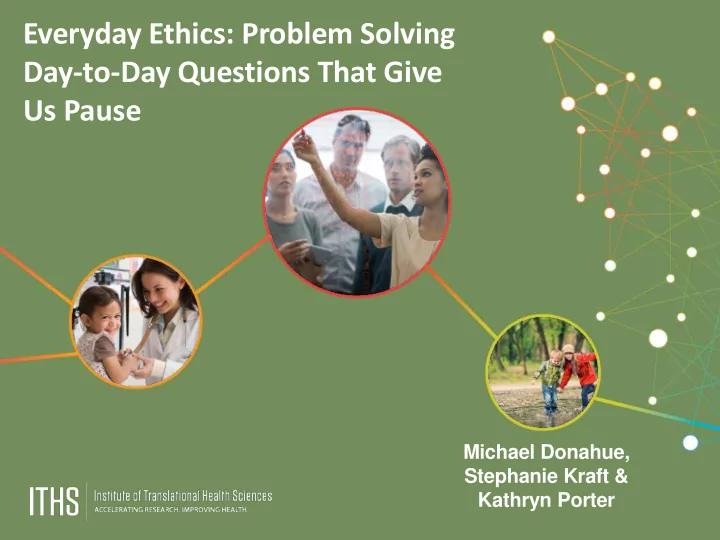

Everyday Ethics: Problem Solving Day-to-Day Questions That Give Us Pause Michael Donahue, Stephanie Kraft & Kathryn Porter
Learning Objectives By the end of this session, you will be able to: • Reflect upon potential ethical concerns in your everyday work • Recognize when potential ethical concerns become ethical dilemmas • Understand when to elevate a situation to the principal investigator 2
What is Ethics? 3
Good Clinical Practice Ethical Conduct Intuition
Overview Background − Ethical principles − Informed consent Case studies − Privacy and confidentiality − Recruitment and subject selection − Informed consent Research ethics consultations 5
Four Ethical Principles Respect for persons • Are we treating people how they want to be treated? Beneficence • Are we maximizing benefits? Nonmaleficence • Are we minimizing harms? Justice • Are we treating people fairly? 6 Belmont Report 1979; Beauchamp & Childress Principles of Biomedical Ethics
Informed Consent “ The voluntary consent of the human subject is absolutely essential.” – Nuremberg Code …but consenting participants raises a lot of ethical questions • Informed consent was an issue in half of research ethics consults across a national collaborative • Other ethical issues: • Privacy and confidentiality • Recruitment • Risks and benefits • Sharing results with participants 7
How do we work through these “everyday ethics” questions?
Case Studies • What gives you pause? • What is the ethical question? • What might change to make you feel differently? • What would you do? • Do you want to include anyone else in the discussion? 9
Case Study: Privacy/Confidentiality You are conducting a chart review to collect clinical information on patients who have been diagnosed with sleep apnea. You open a chart and see that the patient is a physician at your institution. 10
Case Study: Privacy/Confidentiality You are coordinating a study that investigates how people prefer to receive lab test results. One arm of the study is for participants to receive these health results by email. A requirement for participation is that people have an email address. A young woman would like to participate in the study. She does not have her own email account, but shares an account with her sister. 11
Case Study: Recruitment and Subject Selection You are enrolling healthy volunteers in a study that involves frequent blood draws, several overnight urine collections, and keeping a food diary. Someone who is homeless is interested in participating. The PI does not think it is ethical to enroll someone who is homeless. 12
Case Study: Recruitment and Subject Selection (Pediatrics) You are implementing a study that investigates neurodevelopment in typically-developing kids. Study procedures include standard psychological assessments, questionnaires for the participant and parent, and an MRI scan. The PI of the study would like to enroll one of his kids. 13
Case Study: Informed Consent You are in a clinic waiting to talk to a patient about participating in a study that consists of a blood draw and a medical records review. When you go into the exam room there’s a strong smell of marijuana. Should you be concerned about the patient’s ability to give consent? 14
What situations have given you pause?
What if a case is more than just “everyday” ethics?
Case Study: Beyond Everyday Ethics You are part of a study team trying to learn whether young adults (age 18+) who contracted herpes simplex virus (HSV) as newborns are currently experiencing genital shedding. The IRB has approved a plan to ask parents of children who were in an HSV study as infants if the study team can interview their now adult children. However, the team hasn’t been able to recruit a single participant because parents are reluctant to tell their children about the previous study and/or their child’s HSV status. But parents are very interested in learning the study results and anything that might be relevant to their child’s health. Is it ethical for the study team to directly contact the now adult children instead of going through their parents? 17
Additional Information Porter KM, Danis M, Taylor HA, Cho MK, Wilfond BS on behalf of the Clinical Research Ethics Consultation Collaborative Repository Group. 2018. The emergence of clinical research ethics consultation: insights from a national collaborative. Am J Bioeth; 18(1):39-45. Case Study: Beyond Everyday Ethics: Taylor HA, Kuwana E, Wilfond BS. 2015. Recontact and Recruitment of Young Adults Previously Enrolled in Neonatal Herpes Simplex Virus Research. Am J Bioeth 15(10):56-57. Commentaries: o Melvin AJ, Mohan KM, Wald A, Porter K, Wilfond BS. 2015. Research Recruitment of Adult Survivors of Neonatal Infections: Is There a Role for Parental Consent? Am J Bioeth 15(10):58-59. o McKinney RE. 2015. A Knotty Problem of Intertwined Rights. Am J Bioeth 15(10):60-61. o Paquette ET, Ross LF. 2015. Consent is the Cornerstone of Ethically Valid Research: Ethical Issues in Recontacting Subjects Who Enrolled in Research as a Minor. Am J Bioeth 15(10):61-63. 18
19
To request a consultation with the ITHS Bioethics Consult Service: Phone: (206) 616-3875 Email: ithsnav@uw.edu Web: iths.org/bioethics
Recommend
More recommend